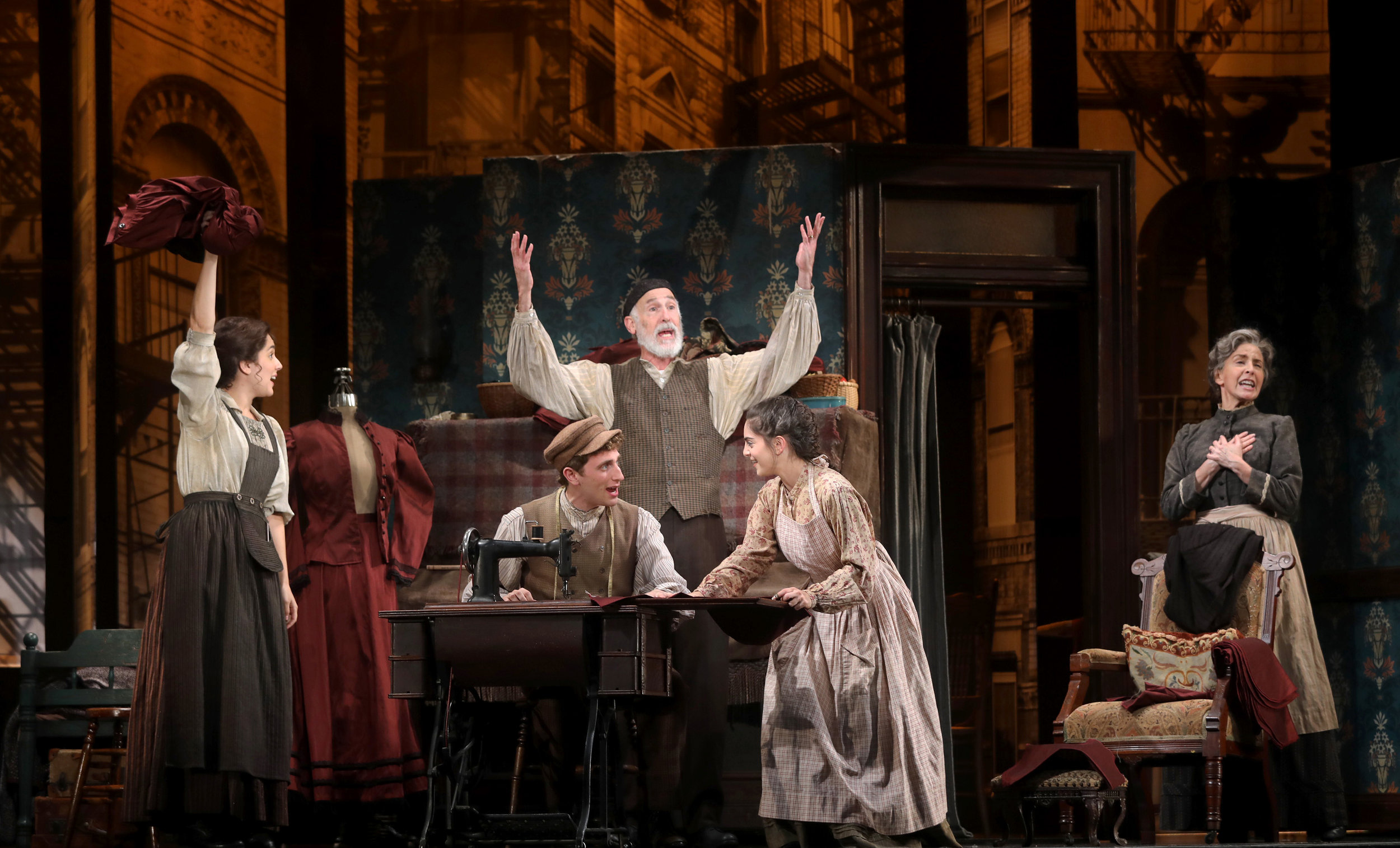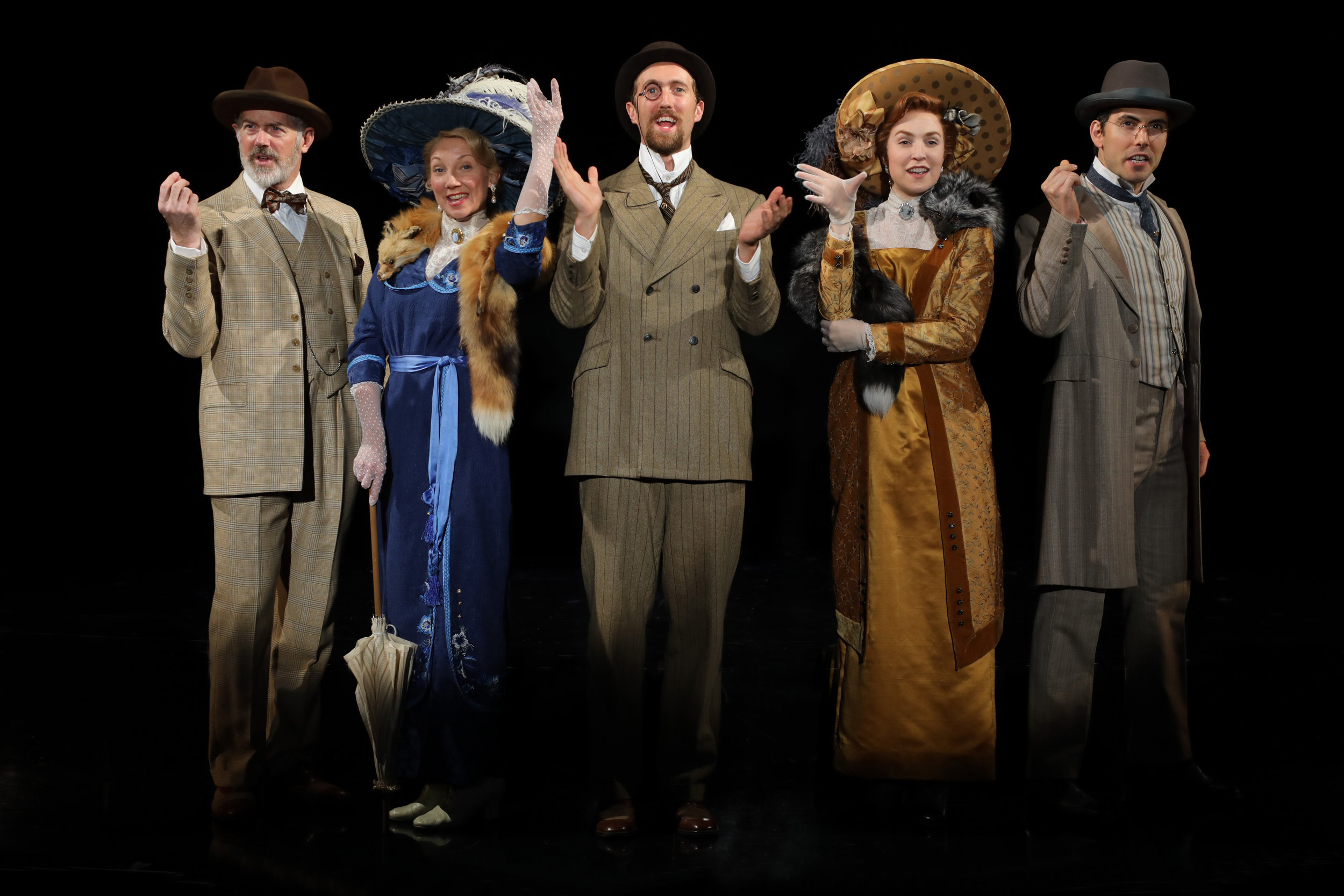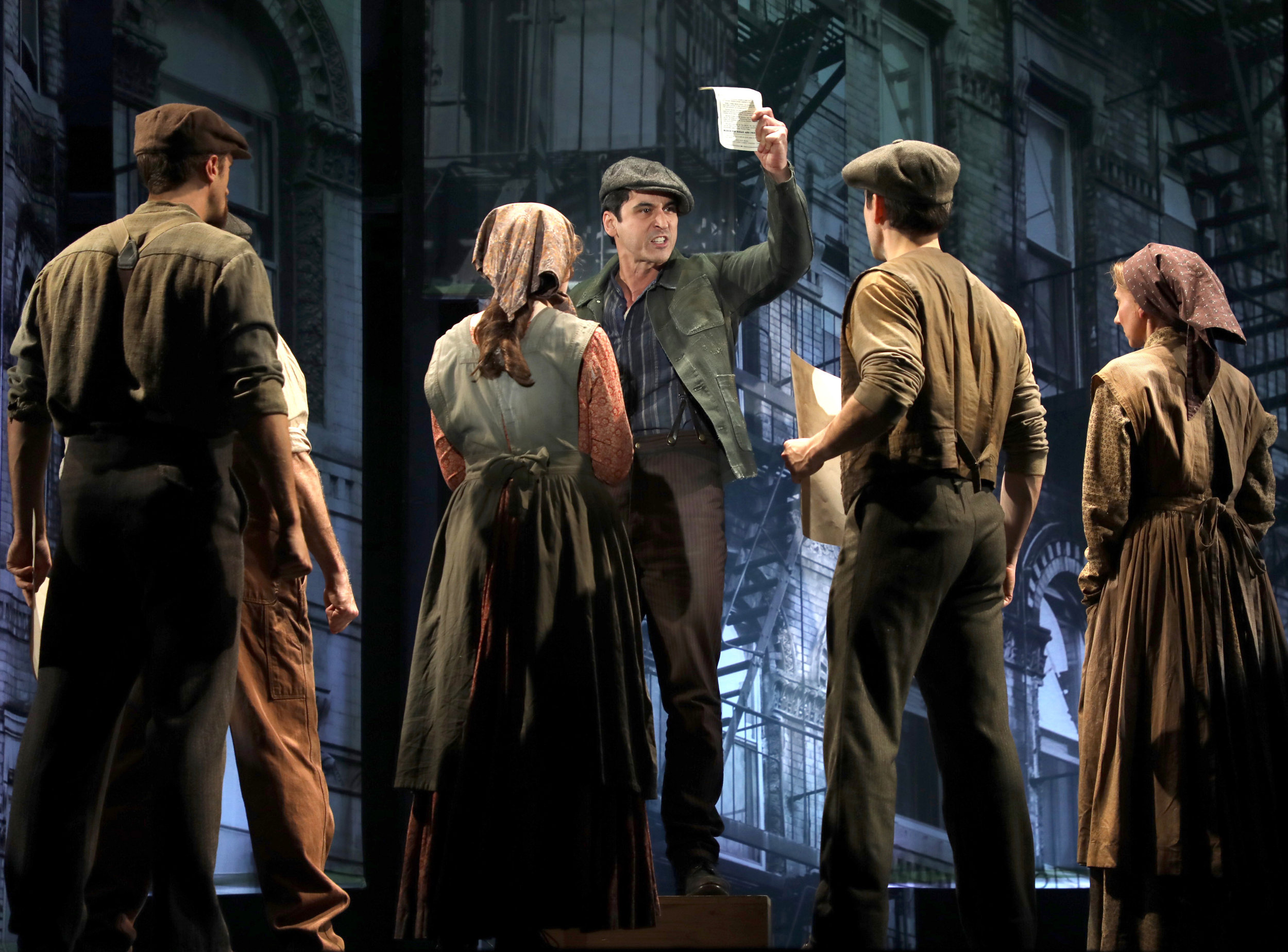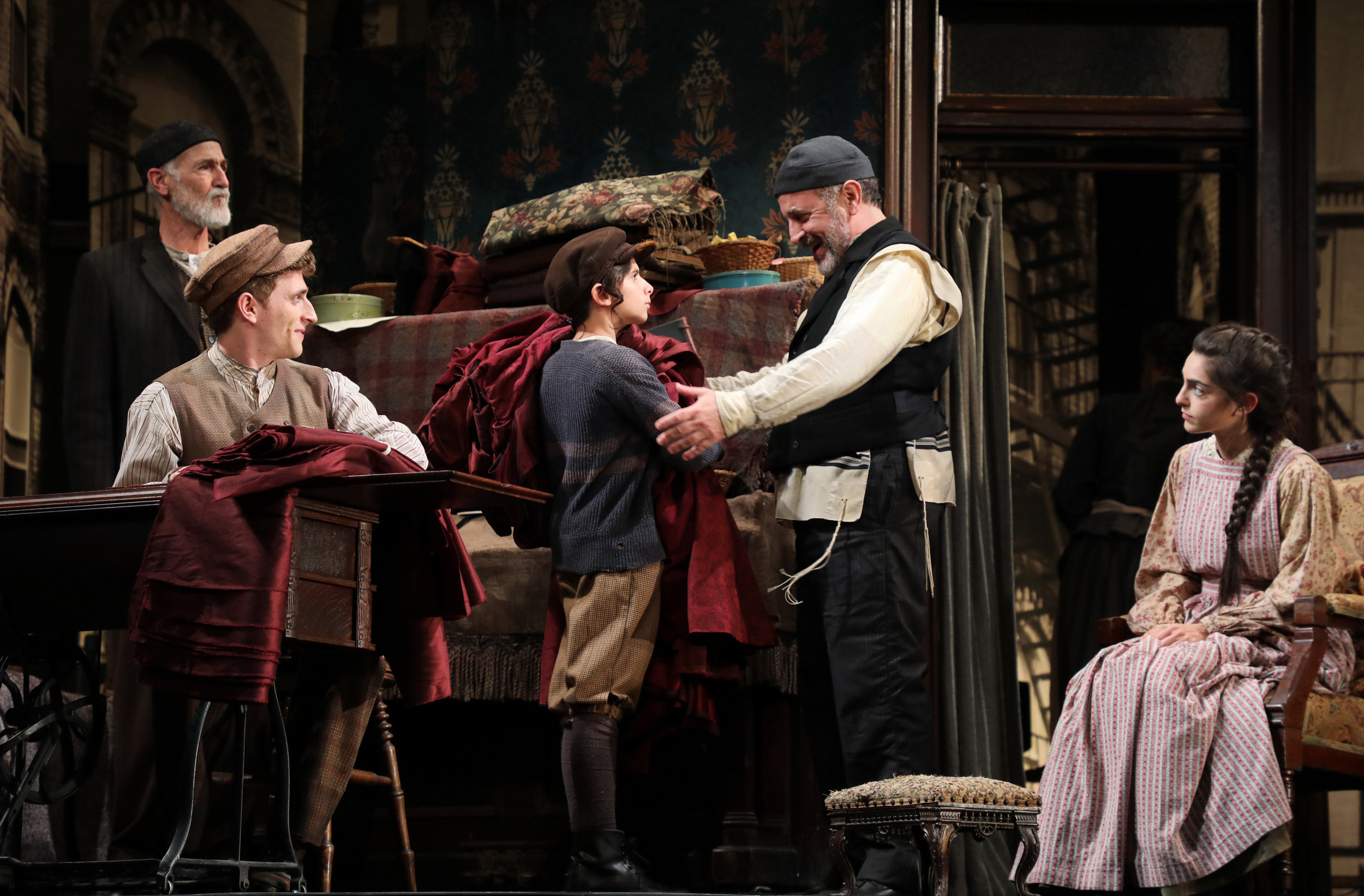Review of Godspell, ACT of Connecticut
The show opens in a dilapidated church that still has lovely stained glass windows and impressive arches but with construction materials littering the floor, in Reid Thompson’s fascinating set. It’s a down-at-heels sacred building, now the home to a group of squatters, many of them children. They come from the shadows to occupy the space and then go into hiding when a troupe of would-be renovators barges in, all giddy with the place’s possibilities as high-end condos.
The newcomers discover a huddled child, then the other kids and their adult leaders present themselves, and presto! the eight interlopers—Jacob (Jacob Hoffman), Katie (Katie Ladner), Alex (Alex Lugo), Andrew (Andrew Poston), Monica (Monica Ramirez), Phil (Phil Sloves), Morgan (Morgan Billings Smith), and Emma (Emma Tattenbaum-Fine)—are transformed into disciples of Jesus (Trent Saunders) and John the Baptist (Jaime Cepero), who proceeds to give Jesus a sponge-bath.
Jesus (Trent Saunders), seated; kneeling: Andrew Poston, Jaime Cepero, Morgan Billings Smith; standing: Phil Sloves, Monica Ramirez, Alex Lugo, Jacob Hoffman, Emma Tattenbaum-Fine, Katie Ladner in The ACT production of Godspell (photo by Jeff Butchen)
In its original incarnation, Godspell, with music by Stephen Schwartz and book by John-Michael Tebelak, dates from the early 1970s and arrived in the context of the hippie movement and the effort by U.S, churches to reach out to the young (remember the invention of the guitar mass?). Jesus’s teachings—with their communal emphasis and their ethical embrace of the poor rather than the rich and powerful—and his leadership of a band of guys who gave up their day-jobs to follow him certainly had immediate appeal in that period. Which may have something to do with reviving the show now. We would seem to have reached an all-time low for ethical behavior in the U.S. of A.
The show, which acts out stories and parables derived from the Gospels of Matthew and Luke, interspersed with songs, mostly of the uplifting variety, has been updated at ACT by Schwartz and director Daniel C. Levine, and that means there are topical references from our day and some new lyrics. An early example, bound to be a favorite bit, features Jesus preaching to “Save the People” while the would-be disciples keep working in comical references to major Broadway shows. Any guesses which ones?
The cast of the ACT production of Godspell, directed by Daniel C. Levine (photo by Jeff Butchen)
What really makes the show at ACT is the spiritedness of the troupe, which manages to shun for the most part the insipid cuteness that may still dog the show from the film version of 1973. Here, the cast is fun and inviting and their professionalism never flags—whether leading the group in the vibrant radio-hit “Day by Day” (Katie), or hitting a pure high note in “All Good Gifts” (Andrew), or belting out “Bless the Lord” (Morgan), or hamming up as fallen goats for “We Beseech Thee” (led by Jacob), or enacting a contrite Magdalene (Monica) in “By My Side,” or demanding we heed the teachings, in “Learn Your Lessons Well,” led by Alex, or putting audience members on the spot as Emma leads off Act II with “Turn Back, O Man.” There are also many nice touches to make the preachiness of all those parables (even a church service is generally limited to a few!) go down easier, including a biblical king (Phil) like Trump by way of Alec Baldwin, and a sleazy judge by the name of Weinstein (Phil), as well as puppetry for the story of the Good Samaritan, interesting use of a painting for a grilling by those pesky Pharisees, some nimble stepping by Jesus and Judas to strobe lights in “All for the Best,” and captivating work with lights in “Light of the World,” led by Phil.
Jesus (Trent Saunders) and Judas (Jaime Cepero) in the ACT production of Godspell (photo by Jeff Butchen)
Throughout Act One, Saunders is a genial and soulful Jesus and casting has wisely eschewed the blond heart-throb type of the most recent New York revival. Saunders is a performer of color and he brings to the role an easy-going gentleness that suits it. In Act Two, when he has to chastise—“Alas For You”—the lyrics get a bit buried by the blasting band, but his passion in the song is convincing. As John the Baptist and Judas, Jaime Cepero is a great asset as well, always commanding attention and playing like a dutiful second lieutenant even when that means a betrayal (which Judas can barely bring himself to do—Jesus kisses him rather than vice versa).
Monica (Monica Ramirez), Jesus (Trent Saunders) in the ACT production of Godspell (photo by Jeff Butchen)
Unlike Jesus Christ Superstar, which visits much of the same hallowed text, the libretto of Godspell stresses the parables of Jesus and avoids presenting his trial before Pilate. The death of Jesus is depicted, and seems a sacrificial gesture by someone whose death is meant to be a good thing. And yet, if you don’t know the story you might be baffled by the mystery of what exactly transpires. The lovely song “Beautiful City” is sung late in the show by Jesus at his most beatific and holds out the hope of “a city of man” rather than a “city of angels” (meant to be a way of saying we need to take responsibility for this world and not expect an otherworldly reward, unless it just means to imply that New York is better than LA).
With its eager effort to make the audience feel themselves in the midst of the action—and the spacious amphitheater at ACT aids greatly in that effect—and its many enthralling effects of light (Jack Mehler) and color and costuming (Brenda Phelps), its engaging cast and its very tight band, this 2020 revival of Godspell is bound to inspire more true believers.
The cast of the ACT production of Godspell, directed by Daniel C. Levine (photo by Jeff Butchen)
Godspell
Conceived and originally directed by John-Michael Tebelak
Music and new lyrics by Stephen Schwartz
ACT production conceived and directed by Daniel C. Levine
Choreography: Sara Brians; Music Supervision: Bryan Perri; Music Direction: Danny White; Scenic Design: Reid Thompson; Lighting Design: Jack Mehler; Costume Design: Brenda Phelps; Sound Design: John Salutz; Props Designer: Abigail Bueti; Production Manager: Tom Swetz; Production Stage Manager: Michael Seelbach
Band: Danny White, conductor, keyboards; Miles Aubrey, electric guitars, acoustic guitars, mandolin; Arnold Gottlieb, electric bass, fretless bass, acoustic guitar; Dennis Arcano, drums & percussion
Cast: Jaime Cepero, Shaylen Harger, Jacob Hoffman, Katie Ladner, Alex Lugo, Cameron Nies, Andrew Poston, Monica Ramirez, Trent Saunders, Phil Sloves, Morgan Billings Smith, Emma Tattenbaum-Fine
Children: Nikki Adorante, Marley Bender, Nate Cohen, Sully Dunn, Adelaide Kellen, Colby Kipnes, Jack Rand, Amélie Simard, Caroline Smith, Dean Trevisani
ACT of Connecticut
February 6-March 8, 2020
















